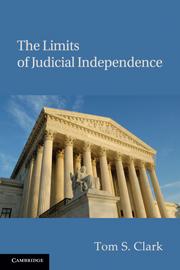Book contents
- Frontmatter
- Contents
- List of Tables
- List of Figures
- Acknowledgments
- 1 Introduction
- 2 A Political History of Court-Curbing
- 3 Conditional Self-Restraint
- 4 Court-Curbing and the Electoral Connection
- 5 Public Support and Judicial Review
- 6 Ideological Implications of Court-Curbing
- 7 The Limits of Judicial Independence
- Appendix A Elite Interview Methodology
- Appendix B Court-Curbing Bills, 1877–2008
- Bibliography
- Index
7 - The Limits of Judicial Independence
Published online by Cambridge University Press: 05 August 2012
- Frontmatter
- Contents
- List of Tables
- List of Figures
- Acknowledgments
- 1 Introduction
- 2 A Political History of Court-Curbing
- 3 Conditional Self-Restraint
- 4 Court-Curbing and the Electoral Connection
- 5 Public Support and Judicial Review
- 6 Ideological Implications of Court-Curbing
- 7 The Limits of Judicial Independence
- Appendix A Elite Interview Methodology
- Appendix B Court-Curbing Bills, 1877–2008
- Bibliography
- Index
Summary
UNDERSTANDING JUDICIAL INDEPENDENCE
The political insulation of its judges has been a source of both pride and criticism for the American federal judiciary. On one hand, independent, politically insulated judges are able to make decisions that are on their face more legitimate than decisions that appear to have been manipulated by politicians or other powerful elites. This is precisely the problem that undermines the integrity of the judicial systems of several other nations, especially those of Eastern Europe. On the other hand, the independence and insulation of our federal judges has caused concern among democratic theorists who recognize a tension between American norms of democracy and majority rule and the great powers held by unelected, unaccountable judges. These sources of pride and criticism beg the question: how independent are these judges? What constraints on their discretion and decision making exist? Is the system we have normatively desirable? In this book, I have tried to offer an answer to the first two of these questions. Here, I offer some concluding remarks on the implications of the findings reported here and speculate about the answer to the third and final question – is the system I have described a good one or a bad one?
Court-Curbing as Position-Taking
The arguments and evidence offered in this book offer insights into the relationship between the public and elite behavior – specifically, I have sought to demonstrate that congressional attacks on the Court can be interpreted as institutional signals about public opinion.
- Type
- Chapter
- Information
- The Limits of Judicial Independence , pp. 255 - 270Publisher: Cambridge University PressPrint publication year: 2010

